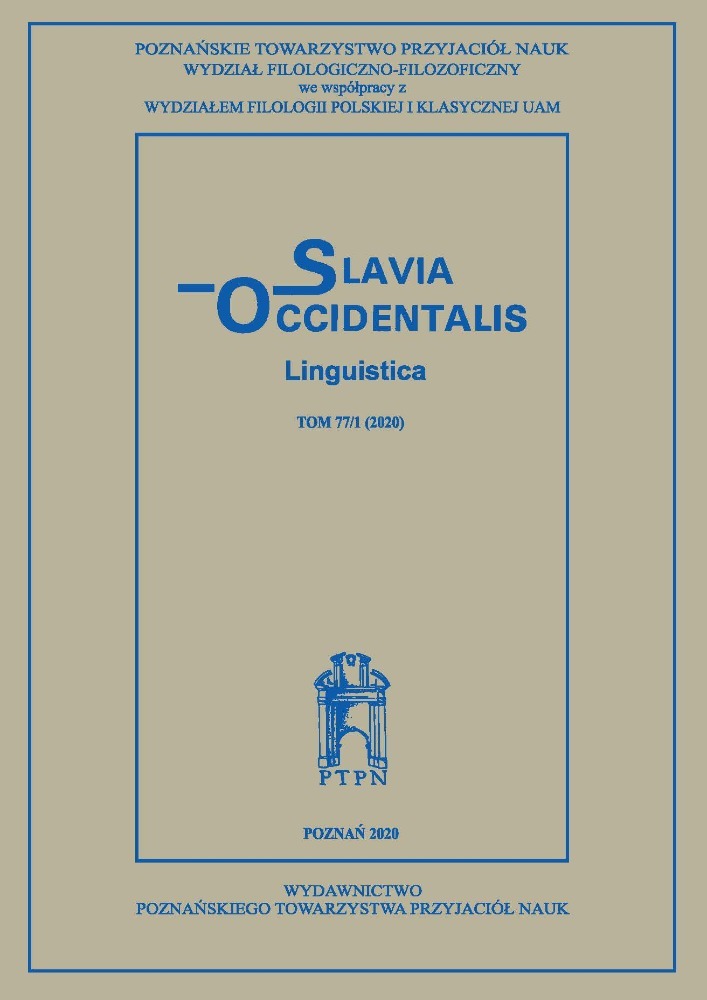Abstrakt
The article discusses the preliminary results of research into the language corpus of the Polish parliamentary transcripts. Emphasis has been placed on a study of the emotional level of randomly selected transcripts. Two important lexemes (concept): niezawisłość and niepodległość have been studied by academics in terms of their use in transcripts. The frequency of these words has been estimated. Moreover, the semantic transformations of these words depending on the use of these lexemes in this discourse have been subjected to an academic study
Bibliografia
Bartmiński J., 2006, Językowe podstawy obrazu świata, Lublin.
Fillmore Ch., 1982, Frame Semantics. Linguistics in the Morning Calm, The Linguistics Society of Korea (red.), Seoul, s. 111-137.
Grabias S., 1980, O ekspresywności języka. Ekspresja a słowotwórstwo, Lublin.
Grabias S., 1994, Język w zachowaniach społecznych, Lublin.
Językowy obraz świata, 1999, J. Bartmiński (red.), Lublin.
Kieraś W., Kobyliński Ł., Ogrodniczuk M., 2018, Korpusomat - a tool for creating searchable morphosyntactically tagged corpora, "Computational Methods in Science and Technology" 24(1), s. 21-27. https://doi.org/10.12921/cmst.2018.0000005 DOI: https://doi.org/10.12921/cmst.2018.0000005
Ogrodniczuk M., 2012, The Polish Sejm Corpus, w: Proceedings of the Eighth International Conference on Language Resources and Evaluation, LREC, Istanbul, Turkey, ELRA, p. 2219-2223.
Ogrodniczuk M., 2018, Polish Parliamentary Corpus. In: Proceedings of the LREC 2018 Workshop ParlaCLARIN: Creating and Using Parliamentary Corpora, Darja Fišer, Maria Eskevich, and Franciska de Jong (edit.), European Language Resources Association (ELRA), Paris, p. 15-19.
Piasecki M., 2014, User-driven language technology infrastructure - the case of CLARIN-PL.
Proceedings of the Ninth Language Technologies Conference. Ljubljana, Slovenia.
Szczyszek M., 2019, Emocje w parlamencie - parlament w emocjach: ujęcie statystyczne. O projekcie słownika polskiego parlamentaryzmu XX wieku (lata 1918-2018), "Prace Językoznawcze", tom XXI, nr 3, s. 203-218. https://doi.org/10.31648/pj.4442 DOI: https://doi.org/10.31648/pj.4442
Walkowiak T., 2017, Language Processing Modelling Notation - Orchestration of NLP Microservices, w: Advances in Dependability Engineering of Complex Systems: Proceedings of the Twelfth International Conference on Dependability and Complex Systems DepCoS-RELCOMEX, s. 464-473. https://doi.org/10.1007/978-3-319-59415-6_44 DOI: https://doi.org/10.1007/978-3-319-59415-6_44
Walkowiak T., Pol M., 2017, The impact of administrator working hours on the reliability of the Centre of Language Technology, "Journal of Polish Safety and Reliability Association Summer Safety and Reliability Seminars" Volume 8, Number 1, s. 167-174.
Walkowiak T., Piasecki M., 2015, Web-based natural language processing workflows for the research infrastructure in humanities, w: "5th Conference of the Japanese Association for Digital Humanities", JADH, s. 61-63.
Żmigrodzki P., Bańko M., Batko-Tokarz B., Bobrowski J., Czelakowska A., Grochowski M., Przybylska R., Waniakowa J., Węgrzynek K. (red.): Wielki słownik języka polskiego PAN.
Geneza, koncepcja, zasady opracowania, Instytut Języka Polskiego PAN, Kraków 2018.
Licencja
Prawa autorskie (c) 2022 Michał Szczyszek

Utwór dostępny jest na licencji Creative Commons Uznanie autorstwa – Użycie niekomercyjne – Bez utworów zależnych 4.0 Międzynarodowe.

